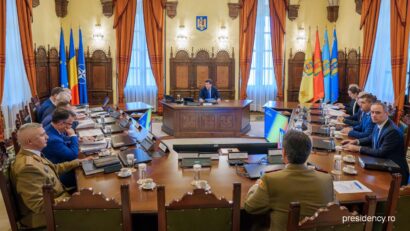Romania and the IMF
Against the background of a deep political crisis, the Romanian government, with 10 outgoing ministers, has approved, during an atypical meeting, the letter of intent under the stand-by loan agreement signed with the International Monetary Fund last year. Previously, the issue had been discussed by the Romanian President, Traian Basescu, and the PM Victor Ponta. The president’s and prime minister’s statements on the issue mirror, once again, the tensions between the two state institutions.
România Internațional, 27.02.2014, 13:51
Against the background of a deep political crisis, the Romanian government, with 10 outgoing ministers, has approved, during an atypical meeting, the letter of intent under the stand-by loan agreement signed with the International Monetary Fund last year. Previously, the issue had been discussed by the Romanian President, Traian Basescu, and the PM Victor Ponta. The president’s and prime minister’s statements on the issue mirror, once again, the tensions between the two state institutions.
On the one hand, President Basescu has announced he mandated PM Ponta, who is also interim finance minister, and Central Bank governor Mugur Isarescu, to sign the letter of intent with the IMF. The head of state, however, set 2 conditions namely that the document should not include the 7-eurocent additional excise duty on fuel and the project aimed at helping people with bank loans to pay their monthly installments, which the President sees as discriminatory.
Moreover, President Basescu has once more accused the prime minister of being corrupt, given that, in his opinion, an increase in the excise duty on fuel would only mean filling the pockets of local barons. As regards the rescheduling of debt payments for a certain category of citizens with incomes below the average net salary, President Basescu says the measure is aimed at deceiving people, because at the end of the day the beneficiaries of this measure would pay even more, if we think of interest rates and the extended reimbursement deadline.
On the other hand, Victor Ponta has stated that the two stipulations contested by Basescu, were not supposed to be included in the letter of intent anyway, as the law on the excise duty on fuel is already in force and the decision to grant fiscal support for the rescheduling of debt payments is not a commitment Romania has to make to the IMF, but a right of the government. The exchange of acid declarations regarding the letter of intent with the IMF started at the end of 2013, when President Basescu announced it would not promulgate the budget for 2014 because of the increase in the excise duty on fuel.
Consequently, PM Ponta promised he would negotiate with the IMF a 3-month extension of the deadline when the excise was supposed to be increased. According to the principle “all’s well that ends well” the budget has been finally promulgated and the letter of intent has been finally signed. The Government should now focus on the country’s economic recovery. The International Monetary Fund estimates a 2.2% economic growth for this year, down from last year’s 2.8%. The budget favours investment, with the infrastructure development among its top priorities. Additional European funds will be of great help, that’s why foreign lenders recommended Bucharest to focus on their absorption.






























